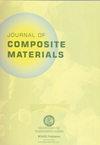Enhancement of the contact behavior of a quasi-isotropic carbon fiber/epoxy matrix laminate with an elastic body by modifying the fiber-matrix interphase using graphene nanoplatelets
IF 2.4
3区 材料科学
Q3 MATERIALS SCIENCE, COMPOSITES
引用次数: 0
Abstract
This study analyzed the effect of incorporating graphene nanoplatelets in the fiber-matrix interphase on the behavior of a multiscale composite laminate based on carbon fibers and epoxy resin subjected to contact loads. The selected loading mode was the contact between an elastic surface and a cylinder. The multiscale composite material used was a quasi-isotropic laminate with graphene nanoplatelets (GnPs) added at the fiber-matrix interface. The specimens were prepared with 0.0%, 0.1%, and 0.25% by-weight GnPs. Laminate beams were used according to the ASTM D7264 standard, and contact was studied in two configurations, applying the load at the edge of the laminate and in the other, in the plane of the test pieces. The normal strains in the contact region were determined experimentally using the interferometric Moiré technique. These results were compared with estimations using the Hertz contact theory and the finite element method (FEM). The normal strains in the contact area of specimens with fibers modified with 0.1% GnPs were lower than those with 0.25% or fibers without surface modification. Excellent agreement between the experimental results along lines in the contact zone with those estimated with the FEM. The normal strains in a direction perpendicular to the applied load obtained by the Hertz theory for the maximum deformation were slightly higher than those obtained by FEM. Except for those calculated for the normal strain in ε通过使用石墨烯纳米片改变纤维-基体间相,增强准各向同性碳纤维/环氧基体层压板与弹性体的接触行为
本研究分析了在纤维-基体相间加入石墨烯纳米颗粒对基于碳纤维和环氧树脂的多尺度复合材料层压板在接触载荷下的行为的影响。所选加载模式为弹性表面与圆柱体之间的接触。所使用的多尺度复合材料是一种准各向同性层压材料,在纤维-基质界面上添加了石墨烯纳米片(GnPs)。制备试样时,GnPs 的重量分别为 0.0%、0.1% 和 0.25%。根据 ASTM D7264 标准使用层压梁,研究了两种配置下的接触情况:一种是在层压梁边缘施加载荷,另一种是在试件平面上施加载荷。接触区域的法向应变是利用干涉莫伊里技术通过实验测定的。这些结果与使用赫兹接触理论和有限元法(FEM)估算的结果进行了比较。使用 0.1% GnPs 改性纤维的试样接触区域的法向应变低于使用 0.25% GnPs 或未进行表面改性的纤维。接触区沿线的实验结果与有限元估算的结果非常一致。用赫兹理论计算的最大变形时垂直于外加载荷方向的法向应变略高于有限元计算的结果。除了计算出的厚度方向载荷在 εy 处的法向应变,尽管其分布与有限元以及实验所得非常相似。
本文章由计算机程序翻译,如有差异,请以英文原文为准。
求助全文
约1分钟内获得全文
求助全文
来源期刊

Journal of Composite Materials
工程技术-材料科学:复合
CiteScore
5.40
自引率
6.90%
发文量
274
审稿时长
6.8 months
期刊介绍:
Consistently ranked in the top 10 of the Thomson Scientific JCR, the Journal of Composite Materials publishes peer reviewed, original research papers from internationally renowned composite materials specialists from industry, universities and research organizations, featuring new advances in materials, processing, design, analysis, testing, performance and applications. This journal is a member of the Committee on Publication Ethics (COPE).
 求助内容:
求助内容: 应助结果提醒方式:
应助结果提醒方式:


